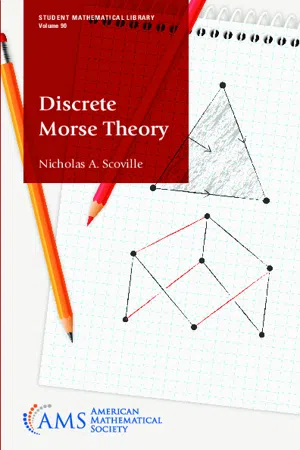Discrete Morse Theory
About this book
Discrete Morse theory is a powerful tool combining ideas in both topology and combinatorics. Invented by Robin Forman in the mid 1990s, discrete Morse theory is a combinatorial analogue of Marston Morse's classical Morse theory. Its applications are vast, including applications to topological data analysis, combinatorics, and computer science.This book, the first one devoted solely to discrete Morse theory, serves as an introduction to the subject. Since the book restricts the study of discrete Morse theory to abstract simplicial complexes, a course in mathematical proof writing is the only prerequisite needed. Topics covered include simplicial complexes, simple homotopy, collapsibility, gradient vector fields, Hasse diagrams, simplicial homology, persistent homology, discrete Morse inequalities, the Morse complex, discrete Morse homology, and strong discrete Morse functions. Students of computer science will also find the book beneficial as it includes topics such as Boolean functions, evasiveness, and has a chapter devoted to some computational aspects of discrete Morse theory. The book is appropriate for a course in discrete Morse theory, a supplemental text to a course in algebraic topology or topological combinatorics, or an independent study.
Tools to learn more effectively

Saving Books

Keyword Search

Annotating Text

Listen to it instead
Information
Table of contents
- Cover
- Title page
- Preface
- Chapter 0. What is discrete Morse theory?
- Chapter 1. Simplicial complexes
- Chapter 2. Discrete Morse theory
- Chapter 3. Simplicial homology
- Chapter 4. Main theorems of discrete Morse theory
- Chapter 5. Discrete Morse theory and persistent homology
- Chapter 6. Boolean functions and evasiveness
- Chapter 7. The Morse complex
- Chapter 8. Morse homology
- Chapter 9. Computations with discrete Morse theory
- Chapter 10. Strong discrete Morse theory
- Bibliography
- Notation and symbol index
- Index
- Back cover
Frequently asked questions
- Essential is ideal for learners and professionals who enjoy exploring a wide range of subjects. Access the Essential Library with 800,000+ trusted titles and best-sellers across business, personal growth, and the humanities. Includes unlimited reading time and Standard Read Aloud voice.
- Complete: Perfect for advanced learners and researchers needing full, unrestricted access. Unlock 1.4M+ books across hundreds of subjects, including academic and specialized titles. The Complete Plan also includes advanced features like Premium Read Aloud and Research Assistant.
Please note we cannot support devices running on iOS 13 and Android 7 or earlier. Learn more about using the app
